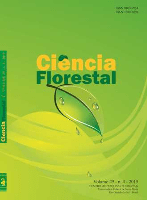
CIENCIA FLORESTAL
Scope & Guideline
Unveiling Discoveries in Sustainable Forestry Practices
Introduction
Aims and Scopes
- Ecological and Environmental Studies:
Research on forest ecosystems, their biodiversity, and the impact of environmental changes on these systems. This includes studies on plant and animal interactions, soil health, and the effects of climate change. - Forest Management and Silviculture:
Papers focusing on practices that promote sustainable management of forest resources, including studies on growth dynamics, regeneration techniques, and the application of silvicultural treatments. - Restoration Ecology:
Research dedicated to the restoration and recovery of degraded forest areas, including studies on native species' reintroduction, soil rehabilitation, and ecological succession. - Biomass and Carbon Stock Assessment:
Studies that quantify biomass and carbon stock in various forest types to evaluate their role in climate change mitigation and sustainable forestry practices. - Forest Products and Utilization:
Research on the physical and mechanical properties of wood, as well as the development of new products and technologies for utilizing forest resources efficiently. - Agroforestry Systems:
Interdisciplinary studies on integrating trees and agriculture, exploring the benefits of agroforestry practices on biodiversity, soil health, and economic viability.
Trending and Emerging
- Climate Change Adaptation Strategies:
Increasing emphasis on research addressing how forests can adapt to climate change, including studies on species resilience, carbon sequestration potential, and adaptive management practices. - Technological Innovations in Forestry:
Growing interest in the use of technology, such as remote sensing, drones, and bioinformatics, to monitor forests, assess biodiversity, and improve management practices. - Biodiversity Conservation and Restoration:
A notable rise in research focused on biodiversity conservation strategies, including habitat restoration, conservation genetics, and the role of forest ecosystems in supporting wildlife. - Integrated Land Use and Management:
Emerging themes around integrated land use planning that combines forestry with agriculture, urban development, and conservation efforts to promote sustainable landscapes. - Socio-Ecological Systems:
An increasing number of studies exploring the interactions between human communities and forest ecosystems, emphasizing the importance of social dimensions in forest management and conservation.
Declining or Waning
- Traditional Forestry Practices:
Research focusing on conventional forestry practices has seen a decrease, possibly due to the increasing emphasis on sustainable and innovative management approaches that align with ecological principles. - Single Species Studies:
There has been a noticeable decline in studies that focus solely on single species without considering their ecological context or interactions within forest ecosystems. - Historical Ecology:
Themes related to historical ecology and traditional ecological knowledge appear to be waning, as the focus shifts towards urgent contemporary issues like climate change and biodiversity loss. - Invasive Species Management:
While still relevant, the frequency of papers specifically addressing invasive species management has decreased, potentially overshadowed by broader ecological studies that encompass multiple factors affecting forest health. - Pest and Disease Management in Isolation:
Research focusing narrowly on pest and disease management without integrating ecological interactions and broader environmental impacts is becoming less common.
Similar Journals

Scientia Forestalis
Innovating research to shape the future of forestry.Scientia Forestalis is a prominent academic journal dedicated to advancing the field of forestry and environmental studies. Established in 1996 and published by the Instituto de Pesquisa e Estudos Florestais (IPEF) in Brazil, this journal provides a critical platform for researchers and practitioners to disseminate innovative studies and findings in forestry. With an HIndex reflective of its academic impact and ranking in the third quartile of forestry journals, Scientia Forestalis is positioned to cater to a diverse audience, including scholars, professionals, and students engaged in agricultural and biological sciences. Despite its non-open access model, the journal maintains a commitment to high-quality research that fosters an understanding of forest ecosystems and sustainable practices. Published articles span a wide range of topics, ensuring that crucial developments in forestry science are captured and shared. The journal's current Scopus rank places it within the 26th percentile, affirming its role in shaping forestry research in a global context, making it an essential resource for anyone interested in this vital field.

FORESTRY
Navigating contemporary forestry challenges with scholarly rigor.FORESTRY is a prestigious journal dedicated to the advancing knowledge and innovative practices in the field of forestry, published by Oxford University Press. Established in 1927, it encompasses a rich history of scholarly contributions and has evolved to maintain its relevance, addressing contemporary issues and research in forestry and related disciplines. With an impressive Q1 ranking in the category of Forestry, this journal holds a notable position within the Scopus rankings, being placed 20th out of 174 in the Agricultural and Biological Sciences domain, highlighting its significant impact with an 88th percentile standing. Researchers, professionals, and students can access critical insights into forestry management, ecology, and policy, facilitating informed decision-making and fostering sustainable practices. While Open Access options are currently not available, the journal's rigorous peer-review process ensures the publication of high-quality research that contributes both to academic advancement and practical applications in forestry worldwide. The comprehensive coverage from 1927 to 2024 makes FORESTRY an invaluable resource for anyone invested in enhancing the field of forestry.
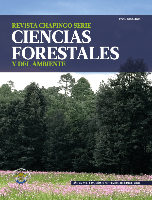
Revista Chapingo Serie Ciencias Forestales y del Ambiente
Innovating solutions for pressing environmental challenges.Revista Chapingo Serie Ciencias Forestales y del Ambiente, published by Universidad Autónoma Chapingo, serves as a prominent platform for scholars and practitioners in the fields of Ecology and Forestry. Established in 2001, this open access journal has made significant strides in disseminating research that addresses pressing environmental issues, particularly within the Mexican context. With an ISSN of 2007-3828 and E-ISSN of 2007-4018, it has been recognized for its contributions, earning a Q3 ranking in both Ecology and Forestry categories as of 2023. The journal is pivotal in fostering collaboration and knowledge exchange among researchers, professionals, and students dedicated to understanding and preserving forest ecosystems. Access to its rich content is unrestricted, enhancing visibility and impact for innovative research and practical applications in sustainable management and conservation practices.

Journal of Forest Science
Innovating research for thriving ecosystems.Journal of Forest Science, published by the Czech Academy Agricultural Sciences, serves as a pivotal resource in the field of forestry and soil science. With its ISSN 1212-4834 and E-ISSN 1805-935X, this Open Access journal has been delivering insightful research since 2003, making knowledge freely available to researchers and practitioners globally. Hailing from the Czech Republic, the journal has established a notable impact within the academic community, as evidenced by its placements in the Q2 quartile for Forestry and Q3 for Soil Science according to the latest rankings. This positions the Journal of Forest Science favorably within academic discourse, ranking #73 out of 174 in Forestry and #84 out of 159 in Soil Science on Scopus, placing it at the 58th and 47th percentiles respectively. Covering a wide range of topics that intersect with environmental sustainability, forest management, and ecological research, the journal aims to foster innovation and collaboration within the scientific community. Researchers, professionals, and students can access published articles easily, bolstering the advancement of knowledge in forest science and its related disciplines.

CANADIAN JOURNAL OF FOREST RESEARCH
Pioneering research for a greener tomorrow.Canadian Journal of Forest Research (ISSN: 0045-5067, E-ISSN: 1208-6037), published by Canadian Science Publishing, stands as a leading platform for disseminating cutting-edge research in the field of forestry and ecological sciences. With an impressive impact factor and a steady reputation for high-quality publications, this journal occupies a prestigious position indicated by its Q1 ranking in Forestry and Q2 in Ecology as of 2023, alongside commendable placements in global and planetary change studies. Covering a broad scope from sustainable forest management to the impacts of climate change on forest ecosystems, the journal encourages submissions that address contemporary challenges and innovations in forest research. Operating from its base in Ottawa, Canada, the Canadian Journal of Forest Research has been a cornerstone of academic discourse since 1974, offering researchers and professionals vital access to pioneering studies that inform policy and practice in forestry. Researchers, educators, and students alike will find this journal an indispensable resource for advancing knowledge and fostering collaboration in the vital realm of forest research.

BOSQUE
Connecting Research with Conservation EffortsBOSQUE, published by Universidad Austral de Chile, Facultad de Ciencias Forestales, stands as a pivotal platform for advancing the field of forestry and related environmental sciences. With an ISSN of 0717-9200, this journal has been committed to disseminating original research, reviews, and case studies essential for understanding forest ecosystems and management practices since its inception in 2006. As of 2023, it holds a Q3 ranking in the forestry category, showcasing a significant yet developing influence in the broader academic landscape, evidenced by its Scopus ranking placing it at the 12th percentile in Agricultural and Biological Sciences - Forestry. While boasting a diverse range of articles, BOSQUE promotes open access to a growing community of researchers, professionals, and students eager to contribute to sustainable forest management and conservation efforts. The journal continues to foster critical dialogue and innovation, making it an invaluable resource for those dedicated to enhancing forest sciences.
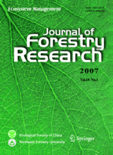
JOURNAL OF FORESTRY RESEARCH
Advancing forestry science for a sustainable future.JOURNAL OF FORESTRY RESEARCH, published by Northeast Forestry University in China, stands as a pivotal platform for advancing the field of forestry science. With an ISSN of 1007-662X and an E-ISSN of 1993-0607, this esteemed journal has maintained its commitment to disseminating high-quality research since its inception in 1997, converging into a recognized authority through the years. Currently boasting a Q1 ranking in the Forestry category for 2023, it ranks 18th out of 174 journals in its field on Scopus, highlighting its vital role in shaping contemporary forestry studies. The journal focuses on a broad spectrum of topics pertinent to forestry, including sustainable forest management, ecology, and conservation efforts, making it an indispensable resource for researchers, professionals, and students alike. Although it is not an open-access publication, the insights shared within its pages promise to contribute significantly to the advancement of knowledge and practices in forestry. The journal's significant impact and relevance are underscored by its operations from Harbin, People's Republic of China, where it continues to foster scholarly communication in the world of forestry research.

Revista Cubana de Ciencias Forestales
Nurturing interdisciplinary dialogue in environmental sciences.Revista Cubana de Ciencias Forestales, published by UNIV PINAR RIO HERMANOS SAIZ MONTES OCA, is a vital resource in the field of forestry and environmental sciences. Since its inception in 2013, this Open Access journal has dedicated itself to disseminating high-quality research and innovations pertinent to forest ecology, sustainable management, and conservation strategies within the Cuban context and beyond. The journal aims to foster academic dialogue among researchers, professionals, and students by providing a platform for the sharing of interdisciplinary studies that address contemporary challenges in forestry. With its commitment to accessibility, Revista Cubana de Ciencias Forestales ensures that knowledge is available to a global audience, thereby contributing to the advancement of forest sciences and ecological awareness.
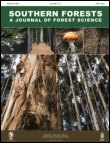
Southern Forests-A Journal of Forest Science
Innovating Research for a Greener TomorrowSouthern Forests: A Journal of Forest Science, published by Taylor & Francis Ltd, serves as a vital platform for scholarly discourse in the field of forestry. With a robust ISSN of 2070-2620 and E-ISSN of 2070-2639, this journal highlights cutting-edge research and vital advancements from 2008 to 2024. Based in the United Kingdom, it continues to make significant contributions, evidenced by its current Q3 ranking in the forestry category of Scopus as well as its rank of 94 out of 174 in Agricultural and Biological Sciences. This journal caters to a diverse audience of researchers, professionals, and students, providing access to high-quality articles that promote sustainable forest management and ecological studies. Despite being classified as a non-open access journal, it remains a key resource, ensuring accessibility to crucial information that addresses both local and global forest challenges.
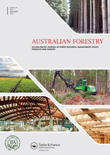
AUSTRALIAN FORESTRY
Shaping Policies for a Greener FutureAustralian Forestry is an esteemed journal dedicated to advancing knowledge in the field of forestry and related environmental science. Published by Taylor & Francis Australia, this journal plays a pivotal role in disseminating high-quality research that spans various aspects of forestry, including sustainable management, conservation practices, and policy analysis. With an impact factor reflecting its significance in the academic community and a Scopus rank of #44 out of 174 in the category of Agricultural and Biological Sciences, Australian Forestry proudly holds a Q2 ranking in its field as of 2023. The journal has maintained a continuous publication record since its inception in 1936, with a commitment to addressing contemporary challenges within forestry. Researchers, professionals, and students alike are invited to engage with this vital resource that fosters insightful dialogue, innovative solutions, and a deeper understanding of forestry science.